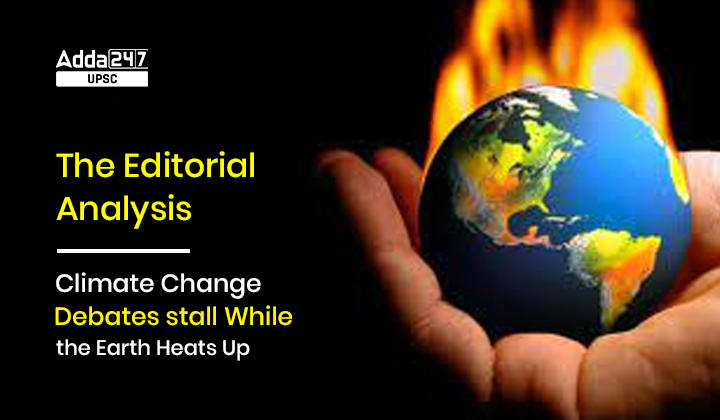Table of Contents
The Hindu Editorial Analysis UPSC Relevance
Climate Change Debates at COP 27: UNFCCC COP 27 2022 is being organized in Egypt. Various participating countries are discussing various aspects of climate change and ways to reduce the climate change and its impact on the world. COP 27 is important for UPSC Prelims Exam (International News/Groupings) and UPSC Mains Exam (international relations and Climate change).
Climate Change Debates at COP 27
- The climate summit in Egypt (COP27) has entered its final week, but news reports indicate that progress has been less than satisfactory.
- The climate talks are expected to end on Friday, but they may continue into the weekend.
Poor progress at COP 27 Climate Change Summit
- No agreement has been reached yet on the ‘loss and damage’ fund, to help vulnerable countries cope with the damage caused by floods, drought and other climate events.
- After much debate, the plan to give immediate aid to victims of climate disasters was finalised.
- However, some countries with limited resources have expressed concern about the scheme’s focus on insurance as it will lead to steeper premiums.
- The debate on carbon offset credits has been slow. Such credits allow countries or companies to pay others to cut greenhouse gas emissions.
- Countries have already pushed to 2023 the decision on which kinds of projects can produce credits – from solar farms to projects to avoid deforestation.
India at COP 27 Climate Summit
- India surprised some nations last week by pushing for a deal to phase down all fossil fuels — oil and gas as well as coal — rather than just focusing on coal, which is what countries agreed upon at last year’s meeting.
- Oil and gas-exporting nations, including the U.S., may oppose this idea because it could hurt demand for their fossil fuels.
Associated Challenges due to Climate Change- Worrying Trends
- A report released at the climate conference shows that emissions from coal, gas and oil are set to reach record levels by the end of 2022.
- While heated debates on the ways of tackling climate change rage on, the Earth is heating up at a faster rate now as higher levels of greenhouse gasses are being released into the atmosphere.
- This is causing ice to melt, oceans to become warmer and sea levels to rise.
- Continuous Increase in annual CO₂ emissions: There is no sign of a peak yet, with emissions rising every year.
- China and the U.S. are the two biggest polluters. While India’s share is on the rise, the European Union’s contribution is waning.
- Due to the rise in emissions, global atmospheric CO₂ concentration has continued its near-vertical increase, which started with the industrial revolution.
- Global atmospheric CO₂ concentration has reached 419 parts per million.
- The rise in CO₂ concentration has continued to cause a rise in global surface temperature.
- Rise in Surface Temperature: According to NASA, “nineteen of the hottest years have occurred since 2000, with the exception of 1998.
- The year 2020 tied with 2016 for the hottest year on record since record keeping began in 1880”.
- Antarctica is losing ice mass due to increasing temperatures.
- Since 2002, Antarctica’s ice mass has varied at the rate of 151 billion metric tonnes per year.
- Rise in Ocean Temperature: Oceans too have been getting warmer because of rising temperatures. The temperature of oceans has warmed up by 337 zettajoules since 1955.
- Sea Level Rise: With ice sheets melting, there is now more water in the oceans. And the warming of oceans is causing water to expand, leading to a rise in sea levels.
- Since January 1993, the global sea level has increased by 102.5 mm.
UNFCCC COP 27 Summit 2022- India’s Agenda at COP27




 TSPSC Group 1 Question Paper 2024, Downl...
TSPSC Group 1 Question Paper 2024, Downl...
 TSPSC Group 1 Answer key 2024 Out, Downl...
TSPSC Group 1 Answer key 2024 Out, Downl...
 UPSC Prelims 2024 Question Paper, Downlo...
UPSC Prelims 2024 Question Paper, Downlo...




